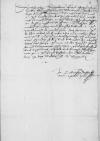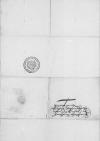List #5410
Ioannes DANTISCUS do Albrecht I von Hohenzollern-AnsbachLöbau (Lubawa), 1534-10-09
Rękopiśmienne podstawy źródłowe:
Publikacje:
| ||||||||||||||
Tekst + aparat krytyczny + komentarz Zwykły tekst Tekst + komentarz Tekst + aparat krytyczny
 GStA, PK, HBA, C 2, No 80, f. 1v
GStA, PK, HBA, C 2, No 80, f. 1v
 GStA, PK, HBA, C 2, No 80, f. 1r
GStA, PK, HBA, C 2, No 80, f. 1r
Durchlauchter, hochgeborner(r) furst, / hochgunstig(e)r, lieber her(r) und freundt. / Meine fruntliche, willige dienst zuvoran(n). /
Wie wol ich dis mol E(wer) Ir(barkei)t nichts sunders zu schreiben(n) hab, / mocht ich dennoch dissen E(wer) Ir(barkei)t moler,
Dat(um)

